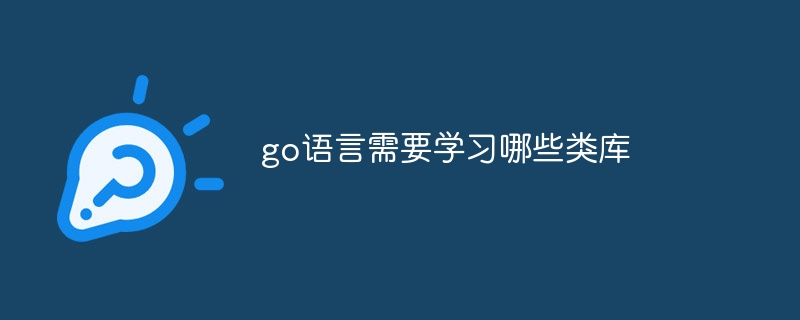
Class libraries that need to be learned in Go language: 1. net/http, built-in HTTP library; 2. database/sql, built-in database access library; 3. gorilla/mux, powerful routing library; 4. gorm, a simple and powerful database ORM library; 5. gin, a lightweight Web framework; 6. logrus, a powerful logging library; 7. viper, a configuration management library; 8. testify, a testing library ;9.jwt-go;10.govalidator.

The operating environment of this article: Windows 10 system, go1.20 version, DELL G3 computer.
Go language is a fast-compiled statically typed language that is accepted and used by more and more developers. Its efficiency, simplicity, and concurrency make it the language of choice for many projects. Although the Go language itself is very powerful, in actual development, using some class libraries can greatly improve development efficiency. Below are some commonly used Go language libraries for developers to learn and use.
1. net/http
net/http is the built-in HTTP library of Go language, which provides the function of processing HTTP requests and responses. Web applications and APIs can be built easily. It supports routing, middleware, file server and other functions and is very easy to use.
2. database/sql
database/sql is the built-in database access class library of Go language. It provides a unified interface to interact with various databases. Developers can use this class library to connect to the database, execute SQL statements, obtain results and other operations.
3. gorilla/mux
gorilla/mux is a powerful routing library. It provides more routing functions than the standard library, such as route grouping, route matching, route variables, etc. Developers can use it to build flexible routing systems.
4. gorm
gorm is a simple and powerful database ORM (Object Relational Mapping) class library. It provides a mapping between structures and database tables, allowing developers to operate the database in an object-oriented manner. gorm supports a variety of databases, such as MySQL, PostgreSQL, etc.
5. gin
gin is a lightweight web framework based on net/http. It provides fast routing, middleware, request parameter parsing and other functions, and is suitable for rapid development of APIs or small web applications.
6. logrus
logrus is a powerful logging library that provides structured log output and hook mechanisms. It can be easily added to applications for easy debugging and issue tracking.
7. viper
viper is a configuration management library that can read configurations from multiple sources (such as command line parameters, environment variables, configuration files) and parse. It supports multiple configuration formats, such as JSON, YAML, Toml, etc.
8. testify
testify is a testing library that provides a variety of assertion and simulation tools for writing unit tests and integration tests. It helps developers write clear, maintainable test code.
9. jwt-go
jwt-go is a class library for generating and parsing JSON Web Token (JWT). It can be used in scenarios such as authentication and authorization, which is very convenient and safe.
10. govalidator
govalidator is a data validation class library used to verify and convert various data types. It provides common data validation rules, such as email, mobile phone number, URL, etc., which can help developers write robust code.
The above are just some commonly used Go language libraries. Developers can choose the appropriate class library according to their actual needs. Mastering and skillfully using these class libraries can greatly improve development efficiency and code quality. In addition, the Go language community is active and there are many other excellent libraries to explore and learn.
The above is the detailed content of Which libraries need to be learned in Go language?. For more information, please follow other related articles on the PHP Chinese website!
 Usage of Type keyword in Go
Usage of Type keyword in Go
 How to implement linked list in go
How to implement linked list in go
 What are the Go language programming software?
What are the Go language programming software?
 How to learn go language from 0 basics
How to learn go language from 0 basics
 What are the methods to implement operator overloading in Go language?
What are the methods to implement operator overloading in Go language?
 What are the operators in Go language?
What are the operators in Go language?
 How to open jsp format
How to open jsp format
 How high will Ethereum go?
How high will Ethereum go?




